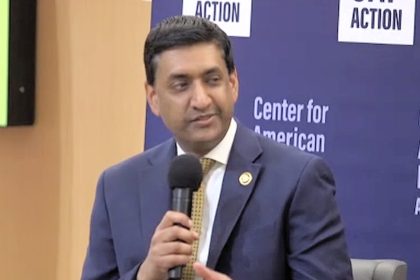Bipartisan Policy Report Suggests Recommendations on Urgent Health Issues

WASHINGTON — While the nation continues to grapple with challenges from the pandemic, a bipartisan group of former policymakers and analysts have come together at the Bipartisan Policy Center, a D.C.-based think tank, to suggest urgent federal actions to accelerate the American response.
Their recently released report includes recommendations on what they perceive to be the most urgent issues, including testing, vaccinations, surge capacity, and equity.
“We can’t afford inaction,” said Tom Daschle, former Senate majority leader, and BPC co-founder, at a virtual conference in advance of the report’s release. “Since the pandemic began, there has been no national comprehensive strategy to address the response. President Biden has issued a series of Executive Orders and called on Congress to provide additional support… but we need an effective and immediate response.”
Daschle offered that successfully tackling a public health emergency of this magnitude would require practical solutions that include political and public health leadership; trust in science and commitment to public health; customized communications that “focus more on empathy than authority;” debunking conspiracy theories; and specifically addressing vulnerable populations.
“Looking back to 1918, we learned lessons that could be translated across the century,” Daschle said. “Both were highly political events… [Now], restoring trust in scientific institutions demands transparency at all levels and is imperative for… successfully defeating the coronavirus.”
Bill Frist, M.D., former Senate majority leader, and BPC senior fellow outlined the report’s six specific bipartisan recommendations, which were offered not only to address the threat of the coronavirus and the nation’s response to it but in an effort to improve the resilience of America’s health care and public health systems.
The recommendations focus on the key issues of testing and contact tracing; vaccine transparency and equitable distribution; surge capacity; supply chain management; racial disparities; and funding.
“[First], expand testing and contact tracing. Implement a national testing strategy that reduces the positivity rate to 5%,” said Frist. The government should also highlight innovations in testing, offer guidance on payment for tests, and state a timeline for achieving testing goals.
“Testing on its own won’t yield the end of the epidemic,” said William Roper, former director of the Centers for Disease Control and Prevention, “but it is an important strategy in controlling further spread of the epidemic. And there is an elemental notion in public health that you can’t have a strategy for containment if you don’t have data.”
The group’s second recommendation is to ensure that vaccine distribution is efficient, transparent, and equitable. This might include using federal assets like FEMA and the National Guard to assist in dispensation, reducing delays in distribution with enhanced coordination, and reconsidering the per capita basis allocation given to states. According to the report’s authors, this key element must include educating the nation on the importance of getting the vaccine.
“Implementation of vaccine distribution is as – or more important – than vaccine efficacy,” said Mark Smith, M.D., founding president and former CEO of the California Health Care Foundation. Efforts to fix the bottleneck in vaccine distribution as a tri-fold issue of supply, distribution, and vaccine hesitancy, must be reduced through coordination at all levels —federal, state, and local.
Next, the report focuses on supporting health care system surge capacity, directing Health and Human Services to maintain and publicly disclose real-time system data to enable better situational awareness and adjust community mitigation measures.
“ICU beds, admissions, PPE… these granular matters could be helpful and would help identify settings with adequate [capacity] as relief health care facilities,” said Frist.
“[Having a hub of information] puts us all in a better position than we were in, and when the next virus hits the country,” added Gail Wilensky, Ph. D., former administrator of the Health Care Financing Administration, now CMS.
The report’s fourth key component is to enhance supply chain management, clearly defining and publicly communicating the authority of agencies at the federal level. While President Biden has already conducted a preliminary gap analysis, ensuring adequate levels of PPE and critical medical materials required for the duration of the pandemic would inform federal agencies as to when the Defense Production Act should be utilized to increase domestic manufacturing capacity.
“You have to have leadership on the national level,” said Roper. “If everyone is free to make their own decision, we end up with mass chaos that only adds to the public’s mistrust. I’m not suggesting that the federal government has all the answers, but there [should be] an established process for bringing experts together.”
BPC’s report also calls on policymakers to evaluate and address racial disparities. While it is currently voluntary for states to submit race and ethnicity data on COVID-19 testing, cases, hospitalizations, and deaths, this recommendation would provide the CDC with the authority to require states and localities—working with health care providers—to provide this data to inform policy decisions that address the unique needs of vulnerable communities.
“There’s a non-random relationship between race, the jobs people have in our society, living conditions, commute conditions, etc.,” said Smith. “This is a complicated and nuanced issue and we need to understand more than just a demographic box. [We need to] stop admiring the problem and start elaborating on solutions.”
Lastly, the bipartisan recommendations report calls for one-time emergency funding for state and local public health departments. In tandem with Congress’ recent relief package resources, this additional spending would allow flexibility to local officials to meet the needs of their unique communities.
“As important as national policy is, we have to make sure we allow for the kinds of differences that will allow the government to best reach out to the people,” said Wilensky. “In our rush to have a more consistent and coherent national message, we still recognize this is a diverse country… and flexibility still needs to be there, particularly to communities that have been hurt the most.”
“The urgency of this moment cannot be overemphasized,” said Leana Wen, M.D., former health commissioner of Baltimore.
The BPC report attempts to provide recommendations for implementing an efficient plan with both Republican and Democratic ideas that have a focus on putting the health of the American people first.
“Our six recommendations attempt to do that,” Wen said. “It’s an important balancing act to get it right.”























